sous-merde
«hallowed be thy Name, thy Kingdom come», that’s ‘the christians Aim’/Islam
Only posting to test an app for Lemmy
We(sterners), aggressors, are still the main(~only) obstacle to ‘world peace’/‘a union of diversities’
♪All we are saaying…♬(, are we even trying ? we could/should protect them&us)
- 22 Posts
- 37 Comments
It was probably never his goal, he just want companies to move outside China in order to hurt it, even if they’re still outside the u.s.
They don’t care about being united in diversity, so if we(sterners) “lose”, i hope that we’ll be treated as awfully as we are/‘have been’ treating others, not that any other country diverse&powerful enough(, able to threaten the u.s.,) will be authorized to emerge again.
When they destroyed the u.s.s.r. they made sure to destroy Yugoslavia, encourage separatism inside the Russian Federation, and support anti-russian forces in ex-USSR countries, after giving “friendly” advices that had the worst economic consequences.
And we(sterners) don’t even have a good reason for ruling supreme, there’s nothing to compare since we have no public plan for the future, no assumed alternative to offer except an ahistorical&amoral modernity promoting selfishness and a capitalist-owned representative democracy with a varying attachment to freedom(, less concerned about comparing it with Freedom than the alleged situation in “regimes”), to the point that we’re even hiding these reasons for desiring hegemony at the expense of a peaceful diversity, and lying about other countries.
The alternative to our attacks would obviously be to work together, but some diversities/differences aren’t tolerated and a war for hegemony is the only plan/future for these mindless brutes, i can only pray that the just/virtuous/good side will win. I don’t know if they will but they deserve a better world.
Yeah well, fuck David Ricardo(, it’s obvious that we should buy&produce locally, his counter-intuitive results are only valid from a consumer viewpoint, not taking into account the jobs created, the taxes collected by the state, the more secondary enterprises benefiting indirectly from a good economic health, …), he was only used to justify a neo-colonialist “free trade” locking “poor”(exploited) countries into selling raw materials, as well as selling the ownership of their companies/mines/‘natural resources’, etc.
Their invaluable ressources were formed over (hundreds of )millions of years and are now sold over a few decades at a very low price set by the market according to the competition(, which isn’t the case for the more advanced manufactured products with less competition, such as selling planes instead of t-shirts).
So fuck David Ricardo, and these countries should ABSOLUTELY agree together to form an economic(&military because coups would follow,) alliance to raise in a concerted manner the prices of their raw materials, who should be at the very least 10, if not 100, times higher, and then use that money to manufacture these objects themselves. But they won’t, tsk, so w/e.
D.Trump is right in his desire to get back american companies in the u.s.a., even if he only did so once he stopped benefiting from it, the u.s. is too powerful to be oppressed for such decisions, unlike :- Haiti in the 1980-1990s, who tried to protect its rice, but the unholy trinity forced them to give up on that measure, and Miami’s rice quickly took over, assholes ;
- Before the 1980s, Ghana produced its own clothes, but because of the western SAPs, they were forced to buy clothes from Europe and Asia and lost their textile industry ;
- In Argentina during the 2000s, Kirchner also tried some protectionnism like China, but as usual the unholy trinity came to order people around, the US, EU, and Japan added to the criticism of the WHO, and commercial pressures forced them to change their mind ;
- Tanzania also tried to do the same for its agriculture, etc.
I won’t forget that the People’s Republic of China was the only non-western aligned country to ever emerge since the colonization(, South Korea and Japan’s rise were only strategic, we helped them at our expense like Israel or Taiwan), and also one of the only ones who refused to follow western advices/orders(, i still consider them protectionnism even if they complied — unwillingly in 1842, 1858, 1860, … ; willingly in the 1980s — with our demands on tariffs, because they :
- subsidized their economy ;
- ‘obtained, through explicit demands of real partnerships unlike the more submissive(trusting?) global South,’&‘are now improving upon’ western technologies, as well as creating new ones(, they were faster) ;
- had reglementations such as forbidding foreign investments in some sectors past a certain percentage ;
- favored local companies for state projects ;
- …
They’ve demonstrated the unprecedented success of their system/‘set of conditions’, and should be imitated by the Global South if it’s indeed better/‘validated by these last decades’. And the chinese civilization has only just started to marvel us if you also like techno-scientific discoveries).
Fuck Ricardo.

More arguments here, among many books.

 7·3 months ago
7·3 months agomass graves
feels like a dissimulation, not only of war crimes but also to prevent the identification of the victims’ status(, children, women, elderly, humanitarians, …), and a body count of the operation.
They wouldn’t have been found if Israel didn’t communicated the location.
So many bulldozers and yet many more lies, they’re even killing patients in hospitals, and have destroyed everything :



« Has not Moses given you the law ? Yet not one of you keeps the law. »
And « As they approached, Jesus said, “Here comes an honest man—a true son of Israel.” », but religion for them is a cultural thing, and they continue to consider themselves victims(, revelations/civilizations came afterwards and honored the legacy of an unworthy little land, yet they rejected it even though they should have disappeared&‘be forgotten’ if not for them). There’s no reason for antisemitism to exist if we’re all atheists yet they still believe that it’s around and that having jewish friends is now somehow compatible with antisemitism(, jews were anti-christians and anti-muslims as well, they just weren’t in power).

At least « two allegations of sexual violence in kibbutz Be’eri — widely reported in the media — were unfounded. », and https://www.ohchr.org/en/press-releases/2025/03/more-human-can-bear-israels-systematic-use-sexual-reproductive-and-other.




https://x.com/RamAbdu/status/1906344566308958466 and https://x.com/RnaudBertrand/status/1902504823326703982

They deny any humanitarian help :



Abu Tawila among others :

See also Dr. Adnan Al-Bursh



More than 100.000 israeli subscribers :

https://archive.ph/iF1rz

https://x.com/AssalRad/status/1903138235309506716
https://x.com/KhalilJeries/status/1903835805686133149
https://x.com/caitoz/status/1904289208912789968
etc., that’s only part of what followed the end of the “ceasefire”, a unilateral massacre of “guilty” civilians from planes like we(sterners) are used to.
Accusations are nice but solutions are better, there’s no way that pro-palestinians countries will allow Palestine to disappear, and they’re too powerful&numerous to be ignored, so Israel may bring down its deserved downfall for refusing to share “their” lands.If the current territory covered by Israel and Palestine was splitted into three between christians, jews, and muslims, then it’d be more easily accepted(, by the israelis,) if the shares were 33% jews, 16.5%+16.5% christians, and 16.5%+16.5% muslims, the five territories with Jerusalem as their capital(, perhaps with a slightly larger territory than currently). The goal of uniting one day in the future as a common territory with three governments may even be stated along with the redrawing of the borders(, and even end up with only one if the three religions of the Book ever fuse one day, Jerusalem/Israel/Palestine would be even more symbolic).
If Israel ends up with a territory of ~9.500km²(, sharing the rest with the two other religions of the Book), they should ideally also be offered a second country of less than 20.000km² somewhere in the world, accepting the location because of their shared ‘presence in’/‘ownership of’ the Sacred Lands. In that case, no need for the division 33 // 16.5+16.5 // 16.5+16.5, a simple 33//33//33 would do. And if it’s spitted 50//50 for jews//muslims, then a second territory of less than 15.000kms² would be enough.

 3·4 months ago
3·4 months agoHuh. I didn’t take a look at your links and kinda expected to have problems with the mods for that comment anyway.
Seems like we have the same opinion and lemmy.ml is indeed not Reddit.Sorry for such a bad comment, i’m french and our president, but far from only him, said a few annoying things that made me want to vent out, honestly i don’t know why, just that it’s one of these times when everything i’m hearing from the radio or t.v. or some twitter accounts of politicians just annoy me, it was a pointless comment in that sense, probably the equivalent of seeking a (verbal )fight in a pub, i was just getting ready to be angry at a poor pro-ukrainian as if it was productive, 🤷

 41·4 months ago
41·4 months agoSo Ukraine wasn’t building up an army to recover Crimea and fight against anti-n.a.t.o. separatism in its south-east ? Zelensky was elected as an alternative to anti-russians(, without the vote of south-eastern ukrainians under an economic blocus among other things), and did the opposite.
It’s just like saying that Russia will invade the rest of Europe or other lies(, probably the russian interferences as well since Russiagate was debunked and we have a strong history of lying, Georgia was the aggressor during the Beijing olympics), we just can’t tell the truth and our population is even ignoring the talking points of the opponent. The non-westerners know our point of view, never difficult to understand, we’re the ones systematically ignoring theirs, and lying with biases visible even to those agreeing with us.
Netanyahu is also a liar but that’s what we(sterners) do, the end justifies the means our leaders/representatives don’t speak from/with their heart, there’s an assumed propaganda of talking points, e.g. unprovoked for Russia or terrorists for Palestine, what are palestinians supposed to do to stop the ongoing colonization and live peacefully together ? What is Russia supposed to do if it’s rejected by the west because of their desire to be independent and in favor of multipolarity, supporting the declared enemies of the “policemen of the world” ? Iran wouldn’t be considered authoritarian if it was zionist.
What matters here is that there are solutions for each problem, we have a strong tendency to consider our opponents crazy/incomprehensible, without explaining/justifying in order to seek a national unity.
Now we’re censoring people for their opinions even more than before, it comes from the state and not platforms, with jail time and fees, but since we’re not killing people for posting unapproved opinions it could be worse. JD Vance was right to criticize the censorship wave of these last years in Europe(, and the US as well in a lesser measure), liberty is our only answer for a lack of egality 🤷(, in some forms, « poverty is slavery » though)

 22·5 months ago
22·5 months agoOne day he’s criticized for saying that Hitler was a communist, the other for apparently assuming his love of nazis.
There’s an old series of books by Terry Goodkind that i’ve read as a child, named the Sword of Truth, each book has a wizard’s rule, and here’s the first one :People are stupid. They believe things mainly because they either want them to be true or fear them to be true.
I’m not particularly fond of these books nor do i agree with this rule, but if you’re political then you’re judging real political actions, such as enacted laws, like adults do, or you’re eventually discussing assumed theories, but not unfair little excerpts regretted afterwards by the one who did them, and we can hopefully both agree that we should not explain our worldview or vote based on the latter, its ‘just for fun’/‘not serious’.
At least most journalists know that it’s only about influencing his future decisions, but you don’t if you believe it was ‘a coming out’/‘something to be discussed seriously’.
That’s just my two cents, thanks for reading my insults towards ~you, and let’s continue not changing.
conspiracy theorists taking us for idiots, nothing new(, even if you’re taking it quite farther than usual).
On the side of real stuff happening : D.Trump said a lot in his inauguration speech, and just put Cuba back on the terrorist states list, as well as signing over twenty executive orders, etc. Seems worth more discussion than your fantasies.
Just unfortunate that, like for D.Trump, you’re too used to discussing the form instead of the content, we’re worth more than selected/biased excerpts.
God(&gods)( in the material world, but also) in the world of Idea(l)s(, and probably other worlds inaccessible to humans as well) :
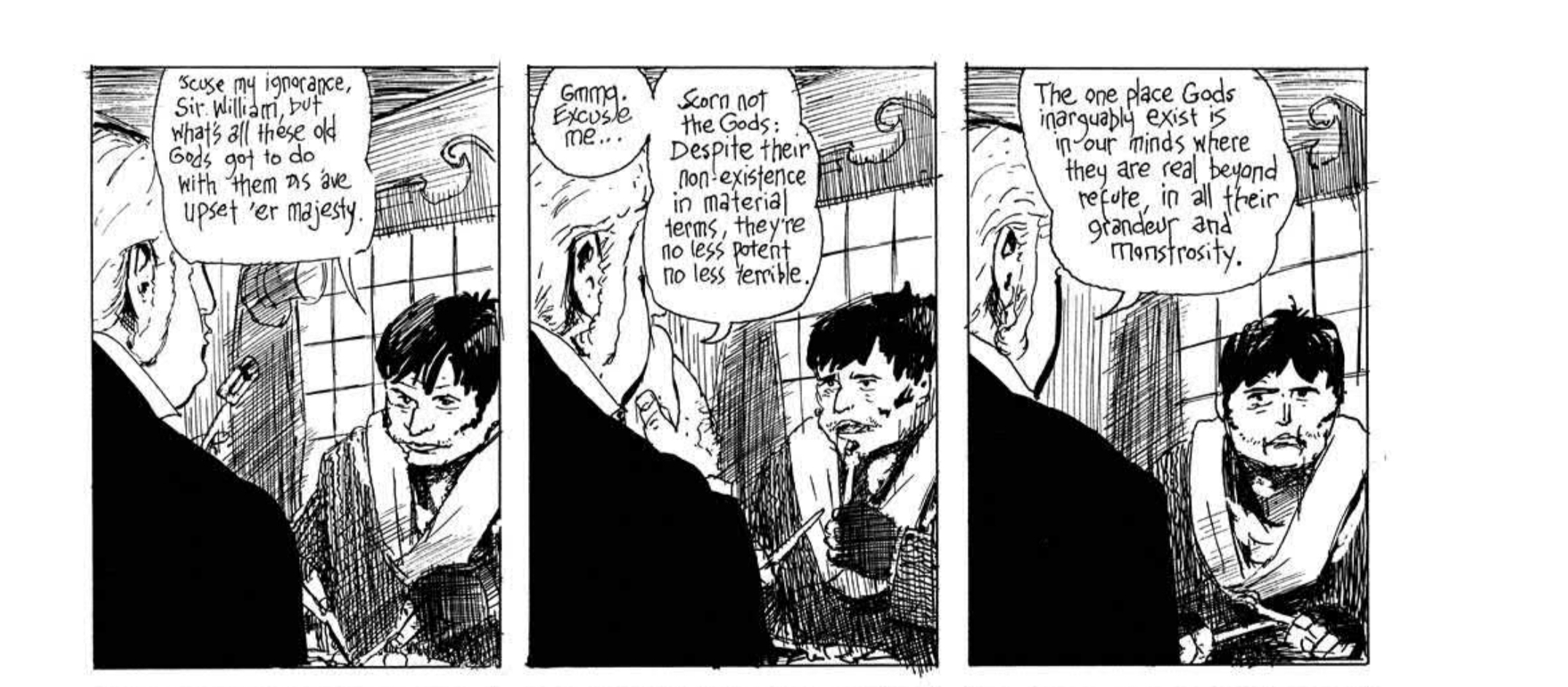
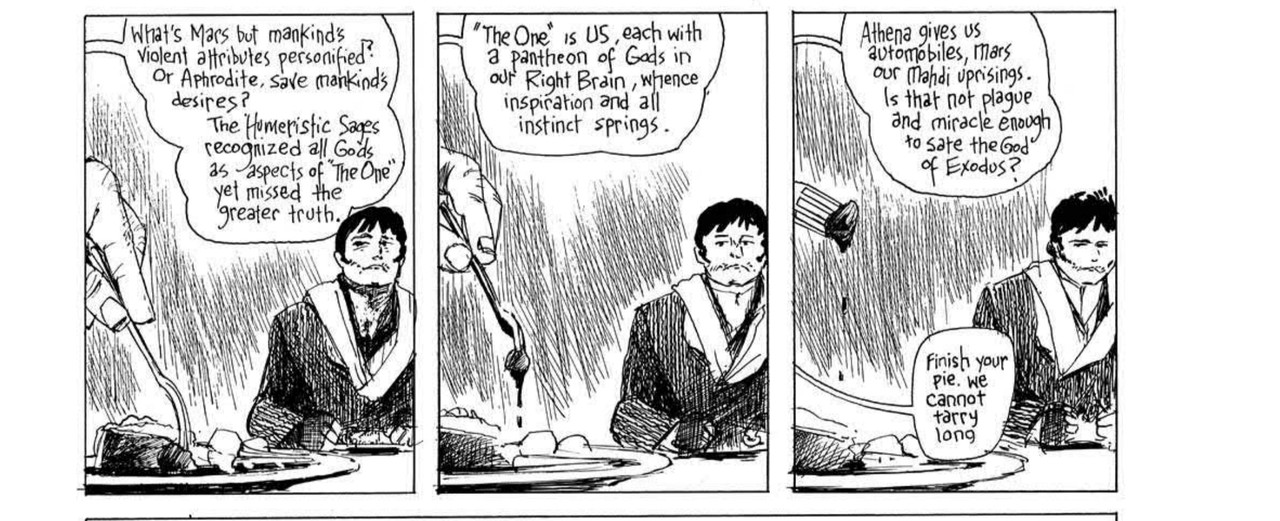

 12·2 years ago
12·2 years agoThe title isn’t exact :
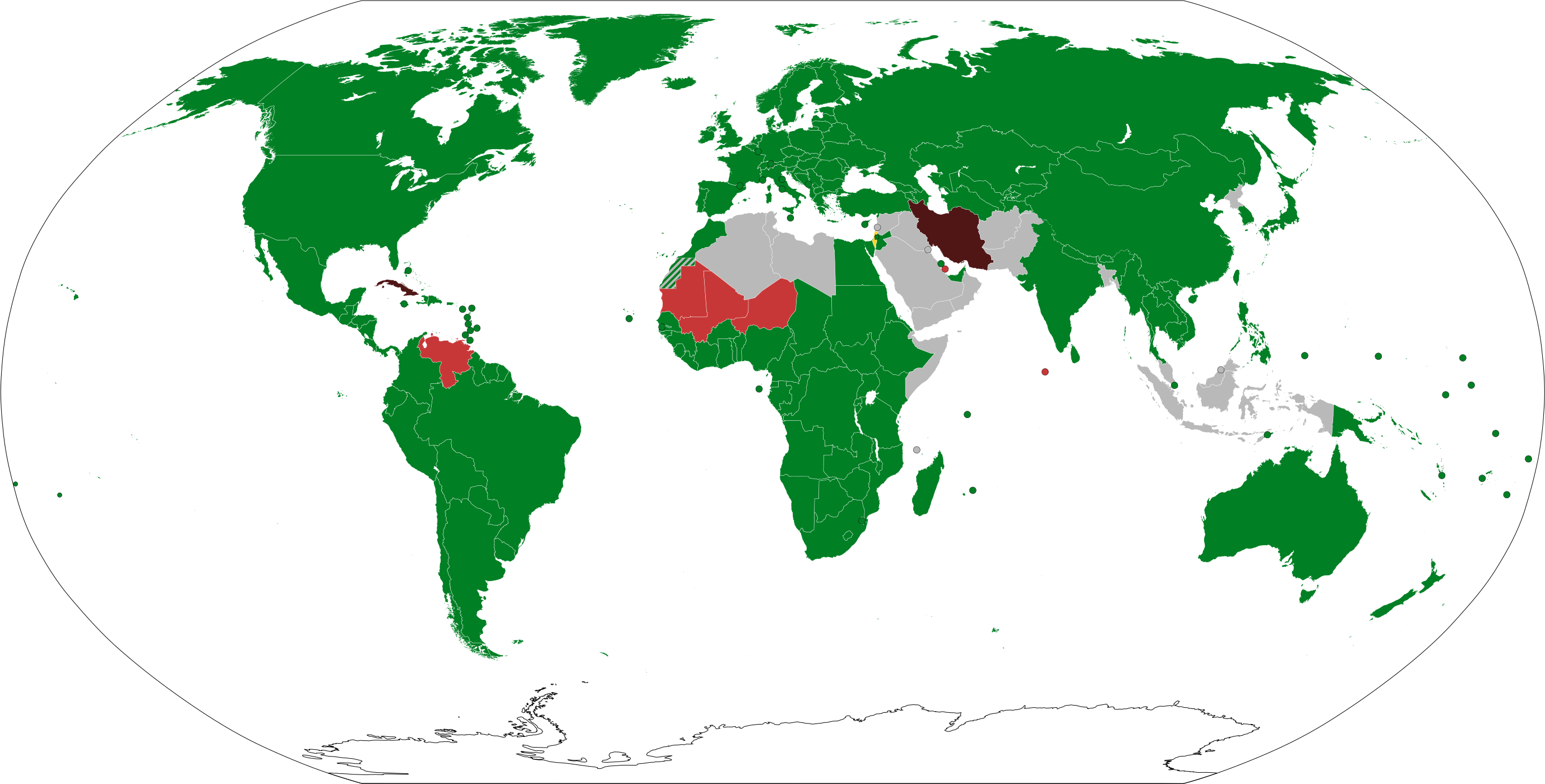

Moreover, their relations were only re-instaured after the western-supported coup by J.Añez :

(Here’s Colombia’s president 6 hours ago b.t.w., among other examples)
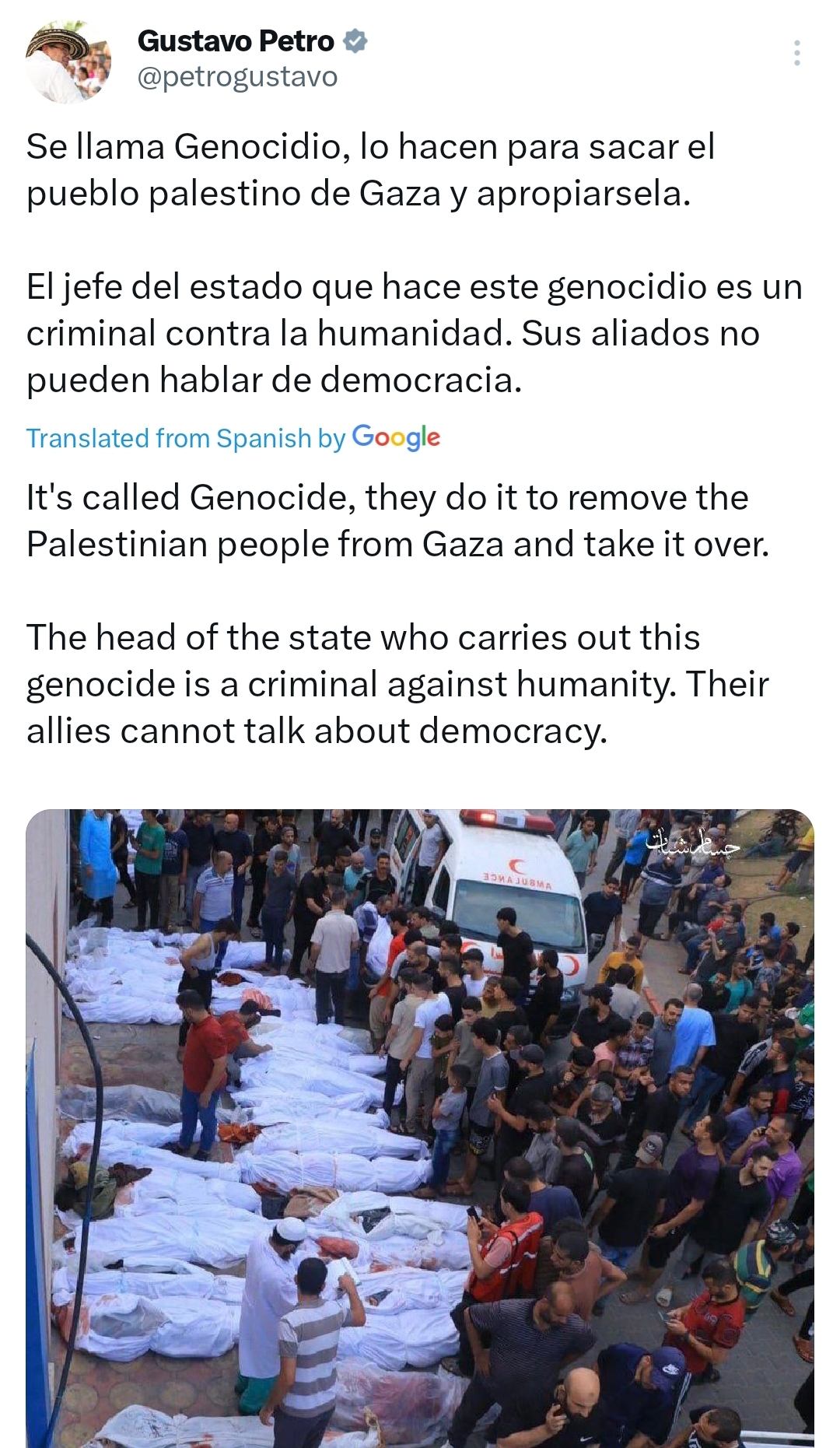
(no need to point out that it would be safer for them not to take position for//against any side. The article also spoke of Argentina, here’s an interesting 2mn-long point of view)

 11·2 years ago
11·2 years agodeleted by creator

 191·2 years ago
191·2 years agoThey claim to fight disinformation yet speak about a “technical glitch”, classic, just like cops lying on their depositions, what a way to set an example.
Unless the creatures, overall, would prefer to have never existed in the first place, then the Creator isn’t evil and should be praised(, that’s only one reason, for example an other one would be our search for Absolute/Greatness/Good/…)

 21·2 years ago
21·2 years agoOne post and zero comment from criitz.
Ideally a fusion of Reddit and Lemmy’s content was what your bot is aiming to do, first thought it’d be illegal, but since we don’t have human reposters i’m glad there’s at least a bot instead.
I don’t entirely agree with my comment either, because there’s multiple interpretation of Hell.
One of them is interesting, it says that if our consciousness survives after our death, our mind will finally think clearly, we’ll remember our past better than if it happened today, and we’ll be overwhelmed by shame, this hell would be created by ourselves.
Another one would talk about a real place, but not in the afterlife but right here, on Earth(, it combines perfectly with this talk of afterlife if you believe in reincarnation), and says that if we all live our lives ‘searching for’/‘aiming at’ God, then our descendants/reincarnations will live in Paradise(, or in Hell if we don’t).
There’re other interpretations, as well as the thought that we’re not free since we’re determined, so God decided before our birth whether we would end up in Hell or in Paradise, a thought discussed in the Middle-Ages and rejected in favor of free-will(, i don’t think Spinoza would disagree with the conclusion that God predestined us for Hell, if he believed in Hell).
Obviously, the most common explanation is that police(wo)men didn’t existed back then, God-fearing people was the equivalent of virtuous people, even when nobody can see/stop them.
They merely said that being separated from God means suffering, while following H…er.im means walking towards the establishment of H…er.is Kingdom/City unto Earth. They talked more about Hell as a state than as a physical place, but, well… who cares nowadays, right ? Parabola never taught us anything about the real world, the spirit doesn’t exist, and morals are relative, they were simply naive ignorants who never had anything to teach us, embrace modernity and reject 100% of the past.
anyone who worships God is also good by default, and of course this logic follows that anyone that doesn’t worship God is evil by default.
If that was the case they wouldn’t put an emphasis on hypocrites.
Justice≠Revenge, otherwise Guantanamo, Abu Ghraib, and the rest, would be justified.
If every evil was stopped though it would be the end of ‘our trip’/‘any possible progress’.

 21·2 years ago
21·2 years agoBecause fighting against disinformation has always been about fighting for the control of the narrative
Big up to all the bots in the comments.
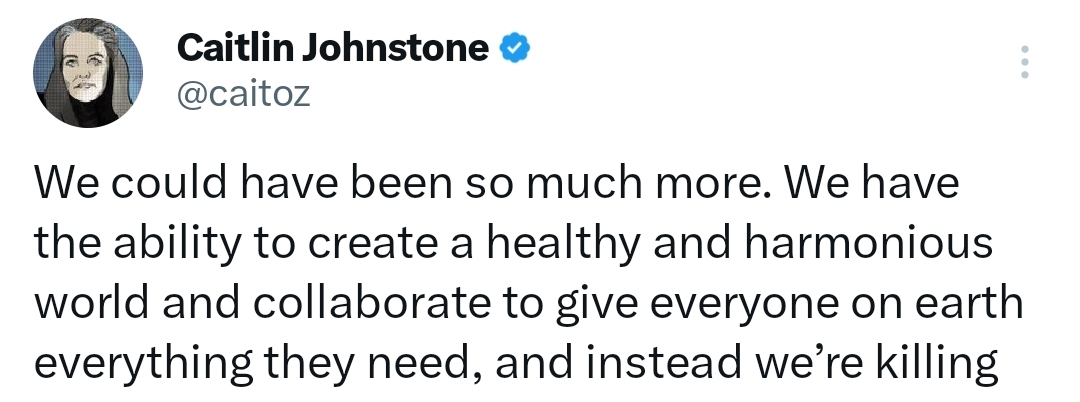








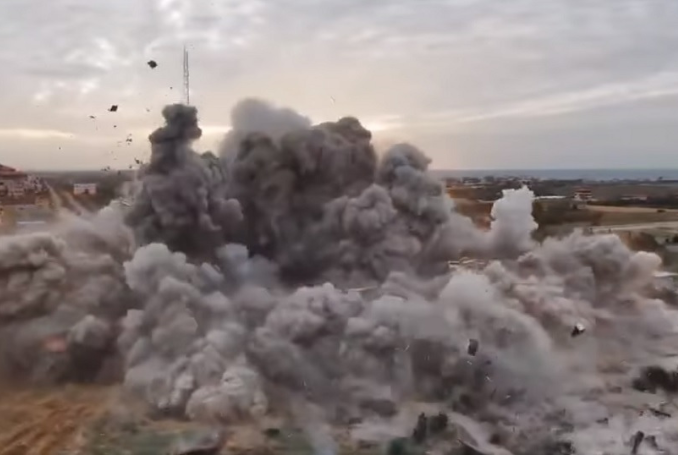


At least Russia granted the long-awaited wish of south-eastern ukrainians, who fought alongside them against pro-n.a.t.o. ukrainians.
And despite being righteous(, since Ukraine historically only accepted referendums benefiting it, instead of ‘trusting in a better future with China’/‘refusing to join those whose “friendly advices” destroyed them in 1991, along with Yugoslavia’, they’re owned by their capitalists/thieves, mind-controlled by the millionaire’s Pravda, so much ashamed of themselves and even of their glorious past when they showed the world what ruling virtuously could look like, e.g. by even refusing hereditary genetics in favor of acquired traits, among thousands of things), russians were much more measured(, including in comparison to the blind destruction by Ukraine, according to the pro-russian propaganda at that time).
Palestine-Israel and Russia-Ukraine-Donbass-Crimea are not the same situations.